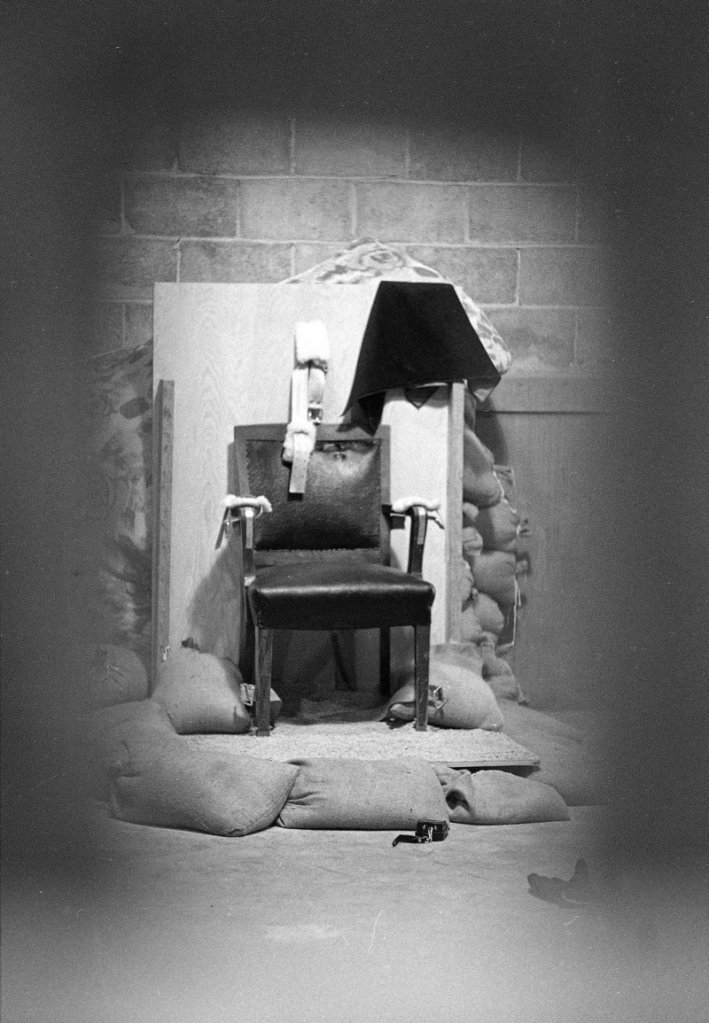SALT LAKE CITY – Utah is set to execute a convicted killer by firing squad after a judge agreed Friday to the inmate’s request, renewing a debate over what critics see as an antiquated, Old West-style of justice.
Ronnie Lee Gardner, 49, was given the choice of being killed by lethal injection or shot by a five-man team of executioners firing from a set of matched rifles — a rarely used method of execution that harkens back to Utah’s territorial history.
“I would like the firing squad, please,” Gardner told state court Judge Robin Reese after hearing his avenues for appeal appear to be exhausted.
Gardner, 49, was sentenced to death for killing an attorney 25 years ago during a failed escape attempt and shootout.
LAWYER: ‘IT’S HIS PERSONAL CHOICE’
Defense attorney Andrew Parnes said he plans to quickly seek a stay of execution and appeal Reese’s ruling to the Utah Supreme Court.
It’s unclear if a stay would be granted, but an appeal, once received, would be promptly reviewed because of the nature of the case, Utah State Courts spokeswoman Nancy Volmer said.
Gardner also has seven days to ask Utah’s Board of Pardons and Parole to commute his sentence to life without the possibility of parole.
This is the fourth time a judge has signed a warrant for Gardner’s execution.
“I don’t think it was a shock or a surprise, and he’s coming to grips with that,” Parnes said. “It’s his personal choice.”
Gardner told the Deseret News in 1996 that he would sue for the right to die by firing squad. “I guess it’s my Mormon heritage,” he said. “I like the firing squad. It’s so much easier and there’s no mistakes.”
Utah’s most famous inmate to die by firing squad was Gary Gilmore, whose demand to be executed for two murders he committed in Utah led to his 1977 execution, the first execution of any kind after the U.S. Supreme Court effectively reinstated capital punishment in 1976.
The nation’s only other firing squad execution since was in 1996, when another Utah inmate, John Albert Taylor, died after being found guilty of raping and strangling an 11-year-old girl.
Of the 35 states with the death penalty on the books, Utah is the only one to still use the firing squad as a method of execution.
In an appeal, Parnes would likely reiterate arguments made to Reese that Gardner had been denied state funds to pay for experts and investigators who could have provided mitigating evidence during the penalty phase of his case.
Assistant Utah Attorney General Tom Brunker said he doesn’t think Gardner is entitled to an appeal, but he may be able to seek an expedited review of his case by the state’s highest court.
“We will vigorously oppose any further stays of execution,” Brunker said.
NEGATIVE MEDIA ATTENTION
Utah’s death row inmates were for decades allowed to choose how they wanted to die. State lawmakers removed that choice in 2004 and made lethal injection the default method, though inmates sentenced before then still have a choice.
The repeal of the firing squad wasn’t tied to any discomfort with the method itself. Rather, state lawmakers disliked the negative media attention that firing squads focused on the state, said Rep. Sheryl Allen, R-Bountiful, who twice carried legislation to change the law.
“In this case people concentrate on the method, rather than the victims,” Allen said.
In 1996, more than 150 media outlets descended on Utah to cover Taylor’s execution, painting the firing squad as an Old West-style of justice that allows killers to go out in a blaze of glory that embarrasses the state.
Lawmakers did not retroactively ban the firing squad out of fear that it would give condemned inmates a new avenue of appeal, Allen said.
Gardner is one of at least four of 10 men on Utah’s death row who have said they want to die by firing squad.
About 20 anti-death penalty protesters demonstrated in the courthouse rotunda before the hearing.
“The firing squad is archaic, it’s violent, and it simply expands on the violence that we already experience from guns as a society,” said Bishop John C. Wester, of Utah’s Catholic Diocese.
Gardner was convicted of the fatal shooting death of Utah attorney Michael J. Burdell during an escape attempt and shootout at the old Metropolitan Hall of Justice in downtown Salt Lake City on April 2, 1985.
On Friday, both Burdell’s girlfriend from 1985 and his father, Joseph Burdell Jr., testified that Burdell would not have wanted Gardner to die in his name.
A pacifist who was drafted into the Army, Burdell served in Vietnam but refused to carry a gun, Donna Nu said.
“He would have not wanted Ronnie Lee’s execution. He didn’t believe in that,” a tearful Nu said. “If Ronnie would have just wounded him and Michael would have lived, he would have defended him.”
— The Los Angeles Times contributed to this report.
Send questions/comments to the editors.



Success. Please wait for the page to reload. If the page does not reload within 5 seconds, please refresh the page.
Enter your email and password to access comments.
Hi, to comment on stories you must . This profile is in addition to your subscription and website login.
Already have a commenting profile? .
Invalid username/password.
Please check your email to confirm and complete your registration.
Only subscribers are eligible to post comments. Please subscribe or login first for digital access. Here’s why.
Use the form below to reset your password. When you've submitted your account email, we will send an email with a reset code.